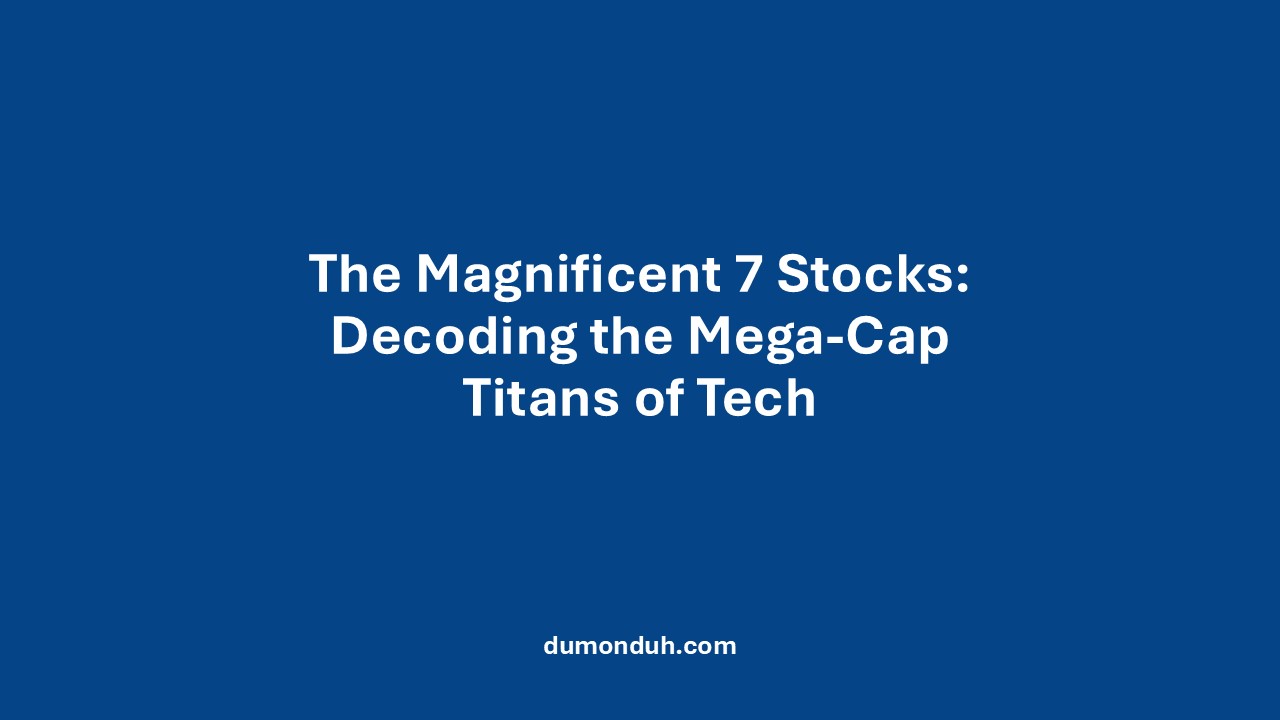The term “Magnificent Seven” refers to seven exceptionally influential and high-performing technology-centric stocks that have largely driven recent U.S. stock market returns. Coined in 2023 by Bank of America analyst Michael Hartnett, the name is inspired by the classic 1960 Western film, denoting a powerful and dominant group.
Key Players and Market Influence
The Magnificent Seven companies are the most dominant firms in the U.S. equity market, primarily spanning the technology, consumer discretionary, and communication services sectors.
The current group consists of:
- Alphabet (GOOGL; GOOG)
- Amazon (AMZN)
- Apple (AAPL)
- Meta Platforms (META)
- Microsoft (MSFT)
- NVIDIA (NVDA)
- Tesla (TSLA)
These companies operate across a diverse set of industries, including internet software/services, telecommunications equipment, internet retail, packaged software, semiconductors, and motor vehicles, with their influence significantly concentrated in the major market indices like the S&P 500 and Nasdaq.
The collective size of the Magnificent Seven is staggering. As of late 2025 data, their combined market capitalization exceeds $20 trillion, accounting for approximately one-third (over 35%) of the entire S&P 500 Index’s total weight. This level of concentration is a notable feature of the modern market.
The Drivers of Dominance
The continued outsized performance and market weight of these stocks are fueled by several core traits:
- Technological Leadership: They are at the forefront of major tech trends, particularly Artificial Intelligence (AI), cloud computing, and electric vehicles, continuously developing disruptive products and services.
- Financial Strength: All maintain robust financial health, characterized by substantial revenue growth, strong earnings, and healthy balance sheets, making them attractive growth investments.
- Adaptability and Innovation: They consistently invest heavily in research and development to adapt to evolving consumer behaviors and technological advances, securing their future relevance.
- Global Scale: Their operations and market reach are worldwide, allowing them to capitalize on international growth and diverse markets.
- Strong Market Position: They often hold dominant market shares in their respective sectors, providing a significant competitive edge and a loyal customer base.
Comparison with FAANG Stocks
The Magnificent Seven has largely superseded the older FAANG acronym, which stood for Facebook (now Meta), Amazon, Apple, Netflix, and Google (now Alphabet).
| Feature | Magnificent Seven (M7) | FAANG |
| Members | Alphabet, Amazon, Apple, Meta, Microsoft, NVIDIA, Tesla | Meta, Amazon, Apple, Netflix, Alphabet |
| Focus | Broader tech/innovation: AI, Cloud, Software, EVs, Semiconductors, E-commerce, Social Media. | Narrower: Internet services, E-commerce, Digital Media, Streaming. |
| Key Difference | Includes Microsoft, NVIDIA, and Tesla, extending dominance across critical, high-growth sectors. | Includes Netflix, but omits Microsoft, NVIDIA, and Tesla. |
| Market Scope | Represents a wider spectrum of the most influential large-cap companies driving current market cycles. | More focused on the initial wave of internet and digital media giants. |
Updated Financial Data and Performance
While the original article provides performance data, the financial landscape of these mega-caps is highly dynamic. The table below provides an updated snapshot of their market capitalization and recent performance context, highlighting their massive scale.
| Company (Symbol) | Industry/Sector Focus | Approximate Market Cap (as of Late 2025) | Noteworthy Performance/Trend |
| NVIDIA (NVDA) | Semiconductors, AI/Graphics | $4.9 Trillion | Leading AI chip innovator; massive long-term growth. |
| Apple (AAPL) | Consumer Electronics, Services | $4.0 Trillion | Dominant in hardware (iPhone) and growing Services division. |
| Microsoft (MSFT) | Software, Cloud Computing (Azure), AI | $3.8 Trillion | Strong growth in cloud services and AI integration. |
| Alphabet (GOOGL/GOOG) | Internet Services, Cloud (GCP), AI | $3.4 Trillion | Core advertising and growing cloud presence. |
| Amazon (AMZN) | E-commerce, Cloud Computing (AWS) | $2.6 Trillion | Global e-commerce leader and cloud market giant. |
| Meta Platforms (META) | Social Media, Interactive Media, VR/AR | $1.6 Trillion | Dominates social platforms; investing heavily in the Metaverse/AI. |
| Tesla (TSLA) | Electric Vehicles, Energy | $1.5 Trillion | Market leader in EVs; performance highly volatile. |
| M7 Total | ~ $21.9 Trillion |
Note: Market capitalization figures are highly volatile and based on search results from late October/early November 2025.
Risks and Investment Considerations
Despite their strengths, investing in the Magnificent Seven carries significant risks:
- Regulatory Scrutiny: As dominant giants, they face constant threats from antitrust laws, data privacy regulations, and international trade disputes, which can impose substantial financial and operational costs.
- Market Concentration Risk: Their disproportionately large weight in major indices means the entire market is highly exposed to the performance of just these seven stocks. A sharp correction in this group could severely impact broader market returns.
- High Valuation and Expectations: Their impressive growth has led to high market valuations (premium P/E ratios), meaning they must continue to deliver exceptional performance to justify their price. Failure to meet lofty investor expectations can result in steep stock price drops.
- Geopolitical and Economic Headwinds: Their global operations expose them to risks from currency fluctuations, geopolitical tensions (e.g., trade wars), and global economic downturns (e.g., inflation and high interest rates increasing borrowing costs).
- Competition and Technological Disruption: Even market leaders must continuously innovate. Failure to adapt to emerging technologies or increased competition from established rivals and startups could lead to a loss of market relevance.
Investment Avenues
Investors can gain exposure to the Magnificent Seven either by purchasing the individual stocks or through investment vehicles. Several Exchange-Traded Funds (ETFs), such as the MAGS Magnificent Seven ETF by Roundhill Investments, specifically track or offer equal-weighted exposure to this group. Additionally, any ETF that tracks the S&P 500 or Nasdaq 100 will naturally have a heavy concentration in these seven companies due to their market weight.

